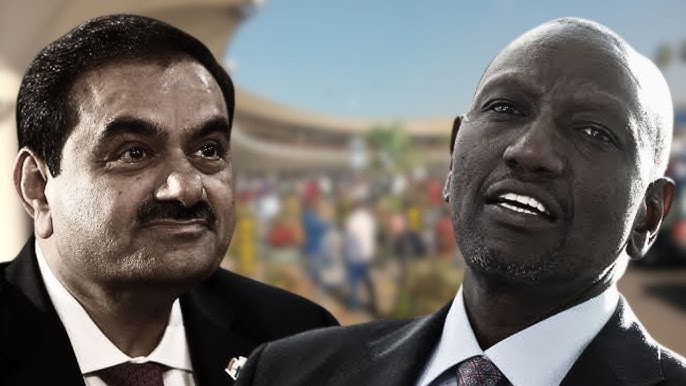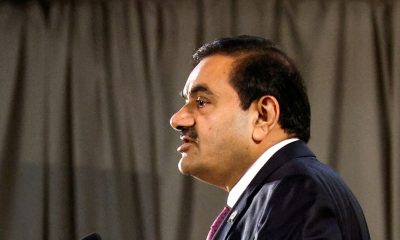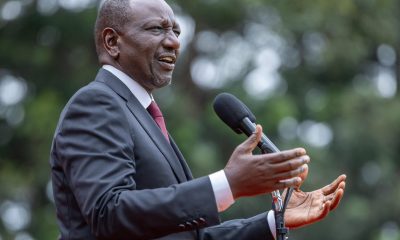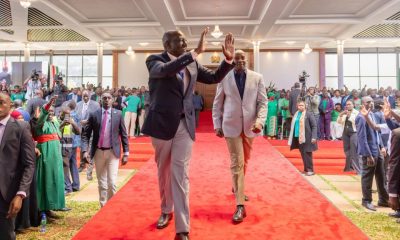Development
Behind Scenes: How The U.S. Forced Ruto To Cancel Deals With Adani In The Last Minute
Sources confirmed that Kenya was facing intense pressure from development partners over the leasing out of JKIA, the official gateway to the region, to an Indian firm facing integrity concerns, especially in the wake of geopolitical upheaval, including the Russia-Ukraine and Israeli-Palestinian wars.

President William Ruto’s decision to cancel the deeply unpopular multi-billion-shilling airport and power transmission deals with troubled Indian conglomerate Adani Group took many by surprise. But it had been long in coming, sources say.
A defiant ruling elite faced with months of spirited public opposition fought to defend the controversial agreements till the last minute, but enormous pressure by authorities in the United States of America after a decisive action to indict Adani companies’ top executives over massive bribery forced the President’s hand.
We’ve learnt that a confluence of factors, including doubts about Adani’s financial injection of only 30 per cent of overall funding required to refurbish, pressure from foreign partners over Jomo Kenyatta International Airport’s security considerations, and an increasingly hostile public with dire political ramifications, forced the rethink.
Integrity issues
Sources confirmed that Kenya was facing intense pressure from development partners over the leasing out of JKIA, the official gateway to the region, to an Indian firm facing integrity concerns, especially in the wake of geopolitical upheaval, including the Russia-Ukraine and Israeli-Palestinian wars.
President Ruto, too, has been under a lot of pressure from Kenyans, the opposition and the clergy, who described the Privately Initiated Partnership with Adani as auctioning off major national assets to a foreign entity.
Then bang: Billionaire Gautam Adani alongside six company executives are charged in New York for allegedly masterminding a bribery and fraud scheme to secure solar power contracts worth Sh260 billion ($2 billion) in future profits! This offered the President an opportunity to reverse the controversial deals and win back some support at home.
The US Department of Justice alleged that Adani and his associates paid over Sh32 billion ($250 million) in bribes to Indian officials while misleading banks and investors in the United States.
“This indictment alleges schemes to pay over $250 million in bribes, deceive financial institutions, and obstruct justice,” Deputy Assistant Attorney General Lisa Miller said in a statement.
The US Department of Justice claimed that Adani personally engaged with Indian officials to execute the fraudulent deals, supported by evidence from documents and phone records.
Adani has denied all charges, dismissing them as baseless.
Ruto’s calculation, therefore, is that the cancellation, while projecting him as a listening president, would offer him a chance to win plaudits from Kenyans while placating foreign partners.
Insiders say that after Adani’s indictment in the United States and the fall of the group’s shares in global markets, the Kenyan government was unsure if the Indian conglomerate still had the 30 per cent counterpart funds and the wherewithal to raise the balance from international financiers to finance the projects.
Corruption perception
“There was also fear that the projects would suffer integrity issues, tainting the image of the country and government,” a Treasury official intimated.
“We doubted Adani’s ability to finance these projects given his 30 per cent commitment. Allowing him to proceed would only reinforce perceptions of corruption in Kenya,” another senior government official said.
Also considered by the Kenya government were fears of losing critical infrastructure in the event of default after being used as collateral by Adani to raise funds from international lenders. Concerns grew over what would happen to the collateral if Adani, facing mounting fraud allegations, went bankrupt.
“I have directed agencies within the Ministry of Transport and the Ministry of Energy and Petroleum to immediately cancel the ongoing procurement,” President Ruto, who attributed the decision to new information provided by investigative agencies and partner nations, said.
Investigations has since established that the government had not yet signed the airport leasing deal, and therefore will unlikely attract any compensation.
According to an earlier Heads and Terms document to the Kenyan authorities by Adani, any termination of the contract would have forced the government to pay any developments as well as losses incurred by Adani at the time of termination. And failure to do so would have dragged Kenya to arbitration courts outside the country.
“Kenyans are not going to pay for terminating the contract because we have a clause on integrity and corruption, which allows us to pull out,” a State House official said.
But it is instructive that any integrity and bribery charges against Adani are yet to be proven in court.
“Adani and his team are already facing charges in the US, and it would be reckless to proceed when most of the financing comes from international banks. If the company collapses, we risk losing crucial infrastructure, which will comprise our country’s security,” the State House official said.
Kiambu Woman Representative Gathoni Wamuchomba commended the US for holding Adani accountable.
“The indictment sets a precedent for addressing public asset grabs disguised as Public-Private Partnerships. All eyes are now on Kenyan courts to ensure accountability,” said Wamuchomba.
Before the American move on Adani, his entry into Kenya had received bipartisan support with backing from the government and the opposition. Former Prime Minister Raila Odinga had defended the Indian firm, citing its involvement in multiple infrastructure projects across Asia, Europe and Africa.
Powerful Kenyans
Barrack Muluka, a political analyst, last month said that Adani may have been a front for powerful Kenyan figures leveraging his projects for personal gain.
“Adani is merely a mask; the real influence comes from within the government. Officials masquerading as investors are transferring public resources into private hands,” Muluka said.
Nelson Amenya, the whistleblower who exposed details of the deal, echoed this sentiment, urging full transparency. “The nation has wasted nearly a year on a project that didn’t take off. Those responsible must be held accountable,” said Amenya, who has been heavily celebrated on social media.
The cancellations have reignited political debates. Lawyer Ahmednasir Abdullahi described the decision as an act of God, attributing the turnaround to external pressure and evidence of corruption.
Adani Group had secured a Sh240 billion deal to manage JKIA for 30 years. This included a second runway and terminal upgrades.
Another Sh85 billion project with Ketraco was to build and operate power transmission lines for 30 years. Both deals drew criticism over corruption fears, potential job losses and the involvement of a scandal-plagued firm.
Intelligence reports
Energy Minister Opiyo Wandayi initially defended the projects, assuring Parliament that there was no evidence of misconduct in the procurement of the power lines deal.
“We relied on rigorous due diligence and have no knowledge of other adverse matters,” he said hours before the President cancelled the contracts.
President Ruto, in his State of the Nation address, confirmed that the cancellation was based on “new information provided by investigative agencies and partner nations.”
“In the face of credible information on corruption, I will not hesitate to act decisively,” Ruto told Parliament, attributing the new information to reports by government agencies following due diligence.
Government sources revealed that intelligence reports from countries where Adani operates, including the US, Australia and Malaysia, played a key role in the decision. Kenyan authorities consulted these nations to assess Adani’s track record, reinforcing the rationale for terminating the deals.
In the wake of the developments in the US, Adani Green cancelled a Sh78 billion ($600 million) bond sale and US financial regulators also charged the company for using deceptive practices to obtain funding.
Defending the group, a spokesperson denied any wrongdoing.
“The Adani Group has always upheld the highest standards of governance,” the spokesperson said.
Kenya Insights allows guest blogging, if you want to be published on Kenya’s most authoritative and accurate blog, have an expose, news TIPS, story angles, human interest stories, drop us an email on [email protected] or via Telegram
-

 Investigations2 weeks ago
Investigations2 weeks agoBillions Stolen, Millions Laundered: How Minnesota’s COVID Fraud Exposed Cracks in Somali Remittance Networks
-

 Investigations2 weeks ago
Investigations2 weeks agoJulius Mwale Throws Contractor Under the Bus in Court Amid Mounting Pressure From Indebted Partners
-

 News2 weeks ago
News2 weeks agoMAINGA CLINGS TO POWER: Kenya Railways Boss Defies Tenure Expiry Amid Corruption Storm and Court Battles
-

 Business6 days ago
Business6 days agoEastleigh Businessman Accused of Sh296 Million Theft, Money Laundering Scandal
-

 Business5 days ago
Business5 days agoMost Safaricom Customers Feel They’re Being Conned By Their Billing System
-

 Investigations4 days ago
Investigations4 days agoInside Nairobi Firm Used To Launder Millions From Minnesota Sh39 Billion Fraud
-

 Business6 days ago
Business6 days agoEXPLOSIVE: BBS Mall Owner Wants Gachagua Reprimanded After Linking Him To Money Laundering, Minnesota Fraud
-

 News4 days ago
News4 days agoUnfit for Office: The Damning Case Against NCA Boss Maurice Akech as Bodies Pile Up




























